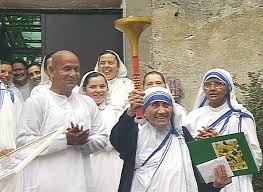Brilliant article in Yes Magazine by Mistinguette Smith: “6 Strategies to Make Powerful Social Change—Starting With “Stay Woke.””
One of the points I make when I give my “‘Impossible” is a Dare (NOT a Fact)” talks is that every one of us has the power to be an agent of change. For every Count Leo Tolstoy (born into wealth and privilege and used his position to work for social change), there are dozens if not hundreds of Martin Luther Kings, Gandhis, and Mother Teresas: ordinary people doing extraordinary things. Most meaningful social change gets accomplished by ordinary people, especially when they organize and work together. I personally started the movement that saved our local mountain. Bree’s courage and power are the norm, not the exception.
I’ve often heard very successful people get asked, “How did you do _____ before you were _______ (the successful person’s name, emphasized)? Even with my own rather limited fame, I’ve been asked “How did you save the mountain before you were Shel Horowitz?”
Here’s what they’re missing. What turned me from Shel Horowitz, self-employed marketing consultant working out of a farmhouse, to Shel Horowitz, locally famous saver of mountains, was going out and starting the movement to save the mountain. It was the doing that created the fame.
Yes, I did have the marketing skills to leverage that and eventually build a brand around profitability consulting for green and socially conscious businesses. Yes, I had the writing and research skills to create a body of work that attracted a major publisher and a celebrity co-author for my eighth book, Guerrilla Marketing Goes Green. Yes, I created enough leverage from that book to be able to do my 10th book, Guerrilla Marketing to Heal the World, comes out in March, with endorsements by Jack Canfield, Seth Godin, the founders of BNI and GreenBiz.com, the author of The New Rules of Green Marketing (among others), and essays from the authors of Unstoppable/Unstoppable Women and Diet for a Small Planet. I grabbed the opportunities to make more of a difference in the wider world, and not just my own community. But just because I made those opportunities happen doesn’t mean they weren’t available to others.
Social change can be based in very small actions. The backstory about Mistinguette Smith’s article is that her editor wanted to ditch the phrase in the title, “Stay Woke.” Mistinguette brought that discussion to Facebook, and that may have been why she eventually won the argument. But the key element to making the change is mindset. This is how I heard about her article before it was published, and how I knew it was published and could read it.
To accomplish positive social change, I think we need two things: one is the sense that we can make a difference and the willingness to try—something any of us can achieve.
The other is the motivation to achieve a higher good than simply obtaining power or profit.I’d even go so far as to say the need to make the world better is a basic human drive, just like food or shelter or sex. If we’re not doing this in some small way, we don’t feel complete.
Let’s look at the difference between two ordinary men who led their countries out of apartheid: Nelson Mandela in South Africa, and Robert Mugabe of Zimbabwe (formerly called Rhodesia). Both were hailed as liberators originally. Mugabe, a teacher and prison-educated lawyer, turned out to be a brutal thug, a dictator motivated by the desire for power and wealth.
But Mandela was clearly motivated by a desire to heal his suffering country. His actions were all about unity and reconciliation. He will be remembered as a hero to the end of time.





